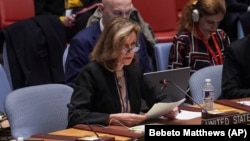Gender equality is one of the United Nations’ 17 Sustainable Development goals, set forth in 2015 and intended to be reached by 2030. Yet with little more than six years to go, progress is slow. Today, women stand at the head of only 28 countries and represent one in four members of parliament. According to UN Women, at this pace, the world will reach gender parity in another 130 years.
“The gender gap in power and leadership remains entrenched; gender-based violence – including technology-facilitated gender-based violence – is increasing; and discrimination remains commonplace,” said United States Permanent Representative to the UN’s Economic and Social Council, Lisa Carty.
“Those who stand in the way of the advancement of women and girls also reduce the prosperity and security of all persons, especially vulnerable groups. They erode the full potential of a democratic way of life. They undermine achievement of the Sustainable Development Goals and the 2030 Agenda. And they make way for the unyielding grip of authoritarianism,” she said.
On the other hand, “Those who stand with women and girls create space for the promotion and protection of human rights and fundamental freedoms for all persons, regardless of gender,” said Ambassador Carty.
“As we focus on the advancement of women and girls in our societies, our nations, and our world, we see a clear connection between the treatment of women and girls and the wellbeing of all people. The evidence is clear: when women and girls are denied the full enjoyment of their human rights all of society is harmed.”
With that in mind, “On the one-year anniversary of Mahsa Amini’s death, President Biden reaffirmed ‘our commitment to the courageous people of Iran’ who are carrying on the historic ‘Woman, Life, Freedom’ movement she inspired,” said Ambassador Carty.
“We applaud the bravery and sacrifice of so many who have stood up in the face of oppression and violence to fight for not just gender equality but also broader fundamental freedoms, which Iran’s government has denied to women.”
“Human rights apply to all individuals, all of the time, everywhere,” said Ambassador Carty. “We therefore question why anyone would seek to deny half of the global population the full enjoyment of their human rights. Societies function best when all persons are included and recognized as equals. Global challenges can only be solved when women and girls in all their diversity have a seat at the table.”






